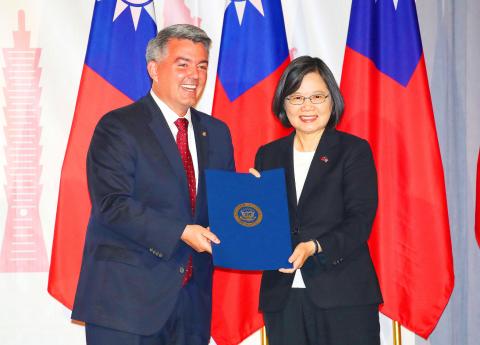US Senator Cory Gardner on Friday urged the US to stand with Taiwan as it faces growing threats, and said that ties between the two democracies are stronger than ever.
Gardner, who represents Colorado, made the remarks before joining Colorado Governor Jared Polis and about 700 Taiwanese expats at a banquet for President Tsai Ing-wen (蔡英文).
“We can look no further than Hong Kong to see the threats that Taiwan faces and the challenges that Taiwan faces. That is why it is more important than ever that we stand with Taiwan,” said Gardner, who chairs the US Senate Foreign Relations Subcommittee on East Asia, the Pacific and International Cybersecurity Policy.

Photo: CNA
He was referring to the Hong Kong protests that have erupted in response to a proposed extradition bill that would allow authorities there to extradite criminal suspects to mainland China to face trial.
Although the Hong Kong government has “indefinitely suspended” the bill, fears persist among Hong Kongers that they could lose their freedoms and rights under China’s “one country, two systems” framework.
Tsai arrived in Denver, Colorado, earlier in the day on the last stop of a 12-day trip that included a stopover in New York City en route to Taiwan’s four diplomatic allies in the Caribbean.
Shortly after Tsai’s arrival in Denver, she had a closed-door meeting with Gardner to discuss security matters, economic opportunities, the Taiwan-US relationship, a possible bilateral free-trade agreement and several other issues, Gardner told reporters.
The US government’s announcement earlier this month of a US$2.22 billion arms package to Taiwan highlighted Washington’s fulfillment of its obligations to Taipei under the US’ Taiwan Relations Act, he said.
“It is also something that we acknowledged in the Asia Reassurance Initiative Act signed into law by the [US] president on Dec. 31, where we will continue making arms sales to Taiwan, that we will regularize and routinize these kinds of sales as we continue to do more,” Gardner said.
He would continue to work with US President Donald Trump’s administration to launch discussions with Taiwan about a potential free-trade agreement, he added.
Tsai’s “historic visit” to Colorado came at a time when “the US-Taiwan relationship is at the strongest point they have ever been,” Gardner said, adding that it was the first time a sitting Taiwanese president had visited the state.
“If you look at the relationship and the support the people of the US have for Taiwan, it has never been greater,” he said.
Yesterday, he and Tsai were to discuss opportunities for cooperation in the energy industry, Gardner said.
“I think this will be a great chance for us to further show what two great democratic voices, the US and Taiwan, can do together,” he said.
Tsai on Friday also held a closed-door meeting with Polis, where they talked about Colorado’s promotion of renewable energy, and cultural and educational exchanges, National Security Council Deputy Secretary-General Tsai Ming-yen (蔡明彥) said.
Polis expressed the hope of seeing more cooperation between the two sides on higher education, given that there are about 200 Taiwanese students in Denver, he said, adding that Polis also pledged to visit Taiwan when he visits Asia next year or in 2021.

CHAOS: Iranians took to the streets playing celebratory music after reports of Khamenei’s death on Saturday, while mourners also gathered in Tehran yesterday Iranian Supreme Leader Ayatollah Ali Khamenei was killed in a major attack on Iran launched by Israel and the US, throwing the future of the Islamic republic into doubt and raising the risk of regional instability. Iranian state television and the state-run IRNA news agency announced the 86-year-old’s death early yesterday. US President Donald Trump said it gave Iranians their “greatest chance” to “take back” their country. The announcements came after a joint US and Israeli aerial bombardment that targeted Iranian military and governmental sites. Trump said the “heavy and pinpoint bombing” would continue through the week or as long

TRUST: The KMT said it respected the US’ timing and considerations, and hoped it would continue to honor its commitments to helping Taiwan bolster its defenses and deterrence US President Donald Trump is delaying a multibillion-dollar arms sale to Taiwan to ensure his visit to Beijing is successful, a New York Times report said. The weapons sales package has stalled in the US Department of State, the report said, citing US officials it did not identify. The White House has told agencies not to push forward ahead of Trump’s meeting with Chinese President Xi Jinping (習近平), it said. The two last month held a phone call to discuss trade and geopolitical flashpoints ahead of the summit. Xi raised the Taiwan issue and urged the US to handle arms sales to

State-run CPC Corp, Taiwan (CPC, 台灣中油) yesterday said that it had confirmed on Saturday night with its liquefied natural gas (LNG) and crude oil suppliers that shipments are proceeding as scheduled and that domestic supplies remain unaffected. The CPC yesterday announced the gasoline and diesel prices will rise by NT$0.2 and NT$0.4 per liter, respectively, starting Monday, citing Middle East tensions and blizzards in the eastern United States. CPC also iterated it has been reducing the proportion of crude oil imports from the Middle East and diversifying its supply sources in the past few years in response to geopolitical risks, expanding

An Emirates flight from Dubai arrived at Taiwan Taoyuan International Airport yesterday afternoon, the first service of the airline since the US and Israel launched strikes against Iran on Saturday. Flight EK366 took off from the United Arab Emirates (UAE) at 3:51am yesterday and landed at 4:02pm before taxiing to the airport’s D6 gate at Terminal 2 at 4:08pm, data from the airport and FlightAware, a global flight tracking site, showed. Of the 501 passengers on the flight, 275 were Taiwanese, including 96 group tour travelers, the data showed. Tourism Administration Deputy Director-General Huang He-ting (黃荷婷) greeted Taiwanese passengers at the airport and